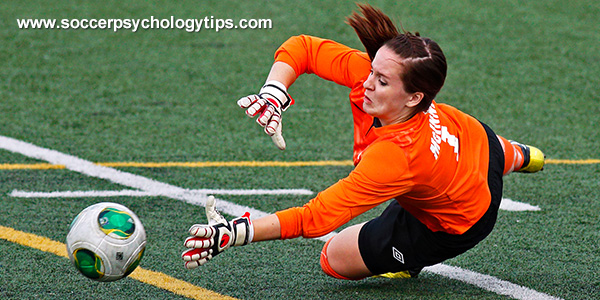
The Goalkeeper’s Mindset
How do you play during critical moments of games? Are you able to quickly rebound from mistakes and re-gain your focus or do you fall apart after a mistake?
How you play is a direct result of your mindset.
Your competitive mindset is the attitude you hold about your play and how you respond to adversity.
If you have a positive mindset, you will be able to overcome mistakes and re-focus on your game.
For example, if an opponent takes the ball away from you and you have a positive mindset, you will push to regain possession of the ball instead of hanging your head in frustration (negative mindset).
Michael Theo, 33, is an Australian goalkeeper who plays for the Brisbane Roar of the Football Federation Australia.
Theo has helped the Roar set the league record for the longest unbeaten streak at 36 games. Theo holds the league record for 876 consecutive scoreless minutes and the most shutouts in a season (13 games).
In a 2014 interview, Theo provided insights into his goalkeeping mindset.
1. Be passionate about your sport and playing during critical moments.
- Theo: “Growing up, I just loved diving in the mud. I would even dive around on cement when I was young. I loved the pressure of knowing you could be a hero if you saved a goal, or cost the team a game if you missed one.”
2. Learn from adversity.
(Theo played one game for Norwich City and lost the game 7-1 and his starting role but learned a tremendous lesson from the loss)
- Theo: “It [the loss] showed me what it really was to be a professional. I trained hard and came back to the A-League hungry… It was the most difficult experience of my playing career but it molded me into the person I am today.”
3. Try to keep an even keel and play in the moment.
Do you find it hard to sleep after games?
- Theo: “Every player dwells on mistakes… but in saying that, I think you learn to move on with those moments. I don’t get too high with the highs or too low with the lows. It is part of the game and I suppose why I have been pretty consistent.”
4. You must manage your game-time emotions and see the game as a challenge rather than fearing failure.
- Theo: “When I was younger I was a ball of nerves. I loved training throughout the week but come game day I was nervous. But with experience you tend to embrace those situations. I love the pressure of finals football. You can’t go into your shell and waste nervous energy.”
5. You must stay focused and immersed in the game.
- Theo: “You are always focused. Even when the ball is at the other end you are often at your most vulnerable, because there is always the possibility of a counter attack. When I am vocal I know I am switched on because I am organizing things in front of me.”
By developing your mindset and how you want to play in critical moments during games, you will be better equipped to rise to challenges and improve your level of play.
Improve your mental game in soccer today with our Soccer Confidence Workbook Program!
Related Sports Psychology Articles
- How to Train Yourself to Mentally Reset during a Soccer Game
- How Soccer Players Thrive Under Pressure
- How Team Culture Leads to Success
- Subscribe to The Sports Psychology Podcast on iTunes
- Subscribe to The Sports Psychology Podcast on Spotify
Download a free sports psychology report to improve your mental game!
Learn more about our one-on-one mental game coaching.
Get the Mental Edge – With Mental Training

Do you perform well in practice, but find yourself under-performing in games? Do you doubt your skills and second-guess yourself under pressure? If so, mental training will help you reach your goals in soccer. Many soccer players have the skill but are held back by low confidence and lack of pregame mental preparation!
You can get expert mental coaching with us from anywhere. Meet with us via Zoom, Skype, FaceTime or phone call. With today’s video technology, we are able to connect with athletes and coaches all over the globe.
Call Us Today to Schedule Your Free 15-Minute Session.
Find Out How You Can Benefit From One-on-One Mental Coaching!
888-742-7225 | 407-909-1700
